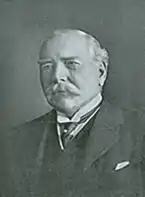William Mather
Sir William Mather PC (15 July 1838 – 18 September 1920) was a British industrialist and Liberal politician who sat in the House of Commons between 1885 and 1904.

Life
Mather was born in Manchester, the son of William Mather and his wife Amelia Tidswell and was educated privately. He became chairman of the engineering company of Mather and Platt, Salford who owned the Salford Ironworks.[1] As an employer he was notable for introducing the eight-hour working day for his workers.[2] He was also a J.P.
Mather was elected as a Member of Parliament (MP) for Salford in 1885, before being removed at the 1886 election. In 1889 he was elected as MP for Gorton in a by-election, a position he held until his defeat at the 1895 general election. He returned to the House of Commons in February 1900 when he won a by-election in the Rossendale division of Lancashire,[3] where he remained until his resignation in 1904.[4] [5]
Apart from his parliamentary and commercial activities, Mather had an interest in the promotion of education, including pioneering the idea of standardised testing. He utilised the results of academic testing in the development of Apprenticeship schemes, at British Westinghouse. It resulted in a selection programme based on tested intelligence. [6] He was on the council of Owen's College and of Manchester University, and was chairman of the Froebel Educational Institute. He was also in charge of the British education section of the Franco-British Exhibition of 1908.[2]
In 1902 he was knighted in the 1902 Coronation Honours for his help reorganising the War Office during the Second Boer War,[7] receiving the accolade from King Edward VII at Buckingham Palace on 24 October that year.[8] He was made a member of the Privy Council in 1910.[9]
Mather married Emma Watson, daughter of Thomas Watson of Highbury, in 1863 and they had five children.[2] Mather is buried in the churchyard of St Mary's Church, Prestwich.
See also
References
- Debretts Guide to the House of Commons 1886
- Obituary: Sir William Mather, The Times, 20 September 1920, p. 13
- "No. 27165". The London Gazette. 16 February 1900. p. 1076.
- Hansard 1803–2005: contributions in Parliament by William Mather
- Craig, F. W. S. (1989) [1974]. British parliamentary election results 1885–1918 (2nd ed.). Chichester: Parliamentary Research Services. pp. 179, 317, 328. ISBN 0-900178-27-2.
- The First Teenagers: The Lifestyle of Young Wage-earners in Interwar Britain by David Fowler
- "The Coronation Honours". The Times (36804). London. 26 June 1902. p. 5.
- "No. 27494". The London Gazette. 11 November 1902. p. 7165.
- L. E. Mather: Sir William Mather, 1838–1920
External links
- Hansard 1803–2005: contributions in Parliament by William Mather
| Parliament of the United Kingdom | ||
|---|---|---|
| New constituency | Member of Parliament for Salford South 1885 – 1886 |
Succeeded by Henry Hoyle Howorth |
| Preceded by Richard Peacock |
Member of Parliament for Gorton 1889 – 1895 |
Succeeded by Ernest Frederic George Hatch |
| Preceded by John Henry Maden |
Member of Parliament for Rossendale 1900 – 1904 |
Succeeded by Lewis Harcourt |